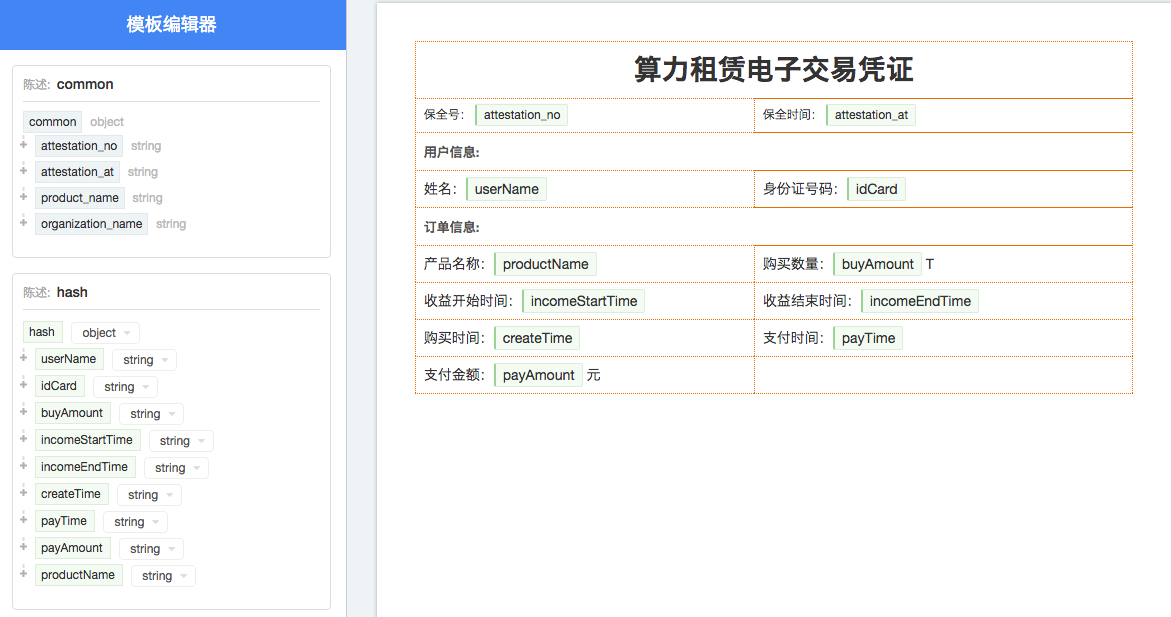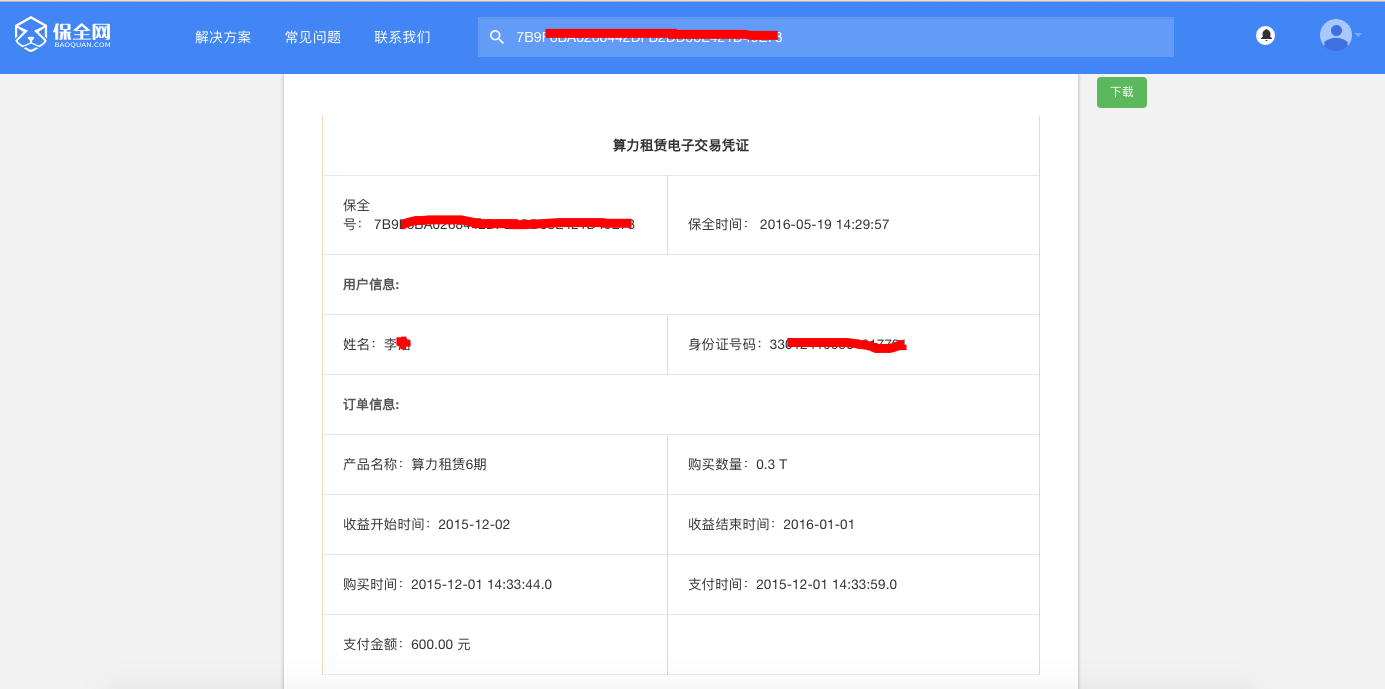Interface¶
Attestations - /attestations¶
When member created the template on Baoquan.com, he/she/it can send data, which is required by consummating the template, through this interface.
payload¶
| Parameter name | Description | Mandatory/Optional |
|---|---|---|
| unique_id | String, the unique id of attestation, length < 255 | Mandatory |
| template_id | String, the ID of template | Mandatory |
| identities | Object, item for identities | Mandatory |
| factoids | Array, factoids set | Optional |
| completed | Boolean value, whether factoids set is uploaded successfully | Optional, default is true |
| attachments | Array, information object of attachments, optional | Optional |
unique_id is the unique code of attestation, which prevent from repeat upload same attestation cause by network timeout or other exceptions. If an attestation uploads several times, we just save once, and return the same attestion id.
Factoid is an Object, which contains two fields: “type”, “data”, for example:
{
"unique_id": "9de7be94-a697-4398-945a-678d3f916b9f",
"type": "hash",
"data": {
"userName": "David Smith",
"idCard": "42012319800127691X"
}
}
The “unique_id” of factoid is similar to the “unique_id” of attestation. If the same factoid contents upload several times at the one attestation, we just handle once.
The “type” is the user defined name of factoids, “data” is the field value of factoids, as following:

The template contains two factoids: “common” and ”hash”. attestation_no, attestation_at, product_name, organization_name in the “common” are provided by Baoquan.com when you are consummating the template. “hash” is defined by members selves, therefore, ,members need to upload that through API.
Template could contain multiple customisable factoids, for example, factoA and factoB. Members could choose to upload twice separately: upload factoA first and set “completed” to false, and then upload factoB again, set “completed” to true.
Note
Once “completed” has been set to true, no more factoids uploading will be accepted.
Assume payload is as below:
{
"unique_id": "acafa00d-5579-4fe5-93c1-de89ec82006e",
"template_id": "2hSWTZ4oqVEJKAmK2RiyT4",
"identities": {
"MO": "15857112383",
"ID": "42012319800127691X"
},
"factoids": [
{
"unique_id": "9de7be94-a697-4398-945a-678d3f916b9f",
"type": "hash",
"data": {
"userName": "Richard Hammond",
"idCard": "330124199501017791",
"buyAmount": 0.3,
"incomeStartTime": "2015-12-02",
"incomeEndTime": "2016-01-01",
"createTime": "2015-12-01 14:33:44",
"payTime": "2015-12-01 14:33:59",
"payAmount": 600
}
}
],
"completed": true
}
After Attestations, you can check the consummated content on Baoquan.com by reference number. As shown below:

Attachments¶
When you uploading the factoids data, you can upload attachments related to the factoids simultaneously. In payload, the “attachments” store the check code of attachments.
Upload a single attachment as “form” data:
<form method='post' enctype='multipart/form-data'>
...
<input type=file name="attachments[0][]">
</form>
payload = {
"unique_id": "...",
"template_id": "...",
"identities": {...},
"factoids": [
{
"unique_id": "...",
"type": "...",
"data": {...}
}
],
"completed": true,
"attachments": {
"0": ["checkSum"]
}
}
Upload multiple attachments as “form” data:
<form method='post' enctype='multipart/form-data'>
...
<input type=file name="attachments[0][]">
<input type=file name="attachments[0][]">
<input type=file name="attachments[1][]">
</form>
payload = {
"unique_id": "...",
"template_id": "...",
"identities": {...},
"factoids": [
{
"unique_id": "...",
"type": "...",
"data": {...}
},
{
"unique_id": "...",
"type": "...",
"data": {...}
}
],
"completed": true,
"attachments": {
"0": [
"checkSum1",
{
"checksum": "checkSum2",
"sign": {
"F98F99A554E944B6996882E8A68C60B2": ["Party A (signature)", "Party A juristische Person (signature)"],
"0A68783469E04CAC95ADEAE995A92E65": ["Party B (signature)"]
}
}
],
"1": ["checkSum3"]
}
}
The “key” of “attachments” is referring as the superscript of the factoids array, for example, “0” correspond with factoids[0]. The “value” of “attachments” is an array, each element correspond with attachment information.
There are two kinds of attachment informations: checksum and sign information, and you must offer checksum. While attachment information contain checksum, you can use String object; While attachment information contain sign information, you need to use object instead.
Note
only pdf attachment can make sign.
The “checksum” is generated from file by SHA256, take Java as an example:
String file = "/path/to/file";
InputStream in = new FileInputStream(new File(file));
// Use SHA256 to hash the file
bytes[] digestBytes = DigestUtils.getDigest("SHA256").digest(StreamUtils.copyToByteArray(in));
// Transform bytes into hexadecimal
String checkSum = Hex.encodeHexString(digestBytes);
Sign is an object, the “key” is caId (when member apply Certification, it will return caId), the “value” is the sign keyword array. For example, Richard and Edward would like to sign at “xxx.pdf” paper, Richard call ca interface to get the caId is “F98F99A554E944B6996882E8A68C60B2”, Edward call ca interface to get the caId is “0A68783469E04CAC95ADEAE995A92E65”, then Richard need to sign at “Party A (signature)” and “Party A juristische Person (signature)”, and Edward need to sign at “Party B (signature)”, so the sign object is like following:
"sign": {
"F98F99A554E944B6996882E8A68C60B2": ["Party A (signature)", "Party A juristische Person (signature)"],
"0A68783469E04CAC95ADEAE995A92E65": ["Party B (signature)"]
}
Note
One user can sign at different sign channel, but keyword should be keep the same, and can’t repeat with the body part.
Returned data¶
When Attestation interface is requested successfully, the reference number will be returned.
| Field name | Description |
|---|---|
| no | String, reference number of the attestation |
For example:
{
"request_id": "2XiTgZ2oVrBgGqKQ1ruCKh",
"data": {
"no": "rBgGqKQ1ruCKhXiTgZ2oVr",
}
}
Add factoids - /factoids¶
Members could use Factoids interface to upload more factoids set.
payload¶
| Parameter name | Description | Mandatory/Optional |
|---|---|---|
| ano | String, the ID of attestation | Mandatory |
| factoids | Array, factoids set | Mandatory |
| completed | Boolean value, whether factoids set is uploaded successfully | Optional, default is true |
| attachments | Array, checksum code of attachments, optional | Optional |
For example:
{
"ano": "2hSWTZ4oqVEJKAmK2RiyT4",
"factoids": [
{
"unique_id": "9de7be94-a697-4398-945a-678d3f916b9f",
"type": "hash",
"data": {
"userName": "Edward Snow",
"idCard": "330124199501017791",
"buyAmount": 0.3,
"incomeStartTime": "2015-12-02",
"incomeEndTime": "2016-01-01",
"createTime": "2015-12-01 14:33:44",
"payTime": "2015-12-01 14:33:59",
"payAmount": 600
}
}
],
"completed": false
}
Returned data¶
| Field name | Description |
|---|---|
| success | Boolean, whether successful or not |
For example:
{
"request_id": "2XiTgZ2oVrBgGqKQ1ruCKh",
"data": {
"success": true,
}
}
Get attestation data - /attestation¶
Member can get get the upload attestation data through this API, such as identities, factoids, etc.
payload¶
| Parameter name | Description | Mandatory/Optional |
|---|---|---|
| ano | String, reference number of the attestation | Mandatory |
| fields | Array, returned fields | Optional, default is true |
Get attestation data such as identities, factoids, attachments should take a long time to access database and decode data, so you can choose which fields you want to return.
Returned data¶
| Parameter name | Description |
|---|---|
| no | Reference number of the attestation |
| template_id | The ID of template |
| identities | Identities |
| factoids | List of factoids |
| completed | Return true if factoids is uploaded, or return fasle. |
| attachments | List of attachments |
| blockchain_hash | The hash of blockchain, return null if it doesn’t link to blockchain yet |
attachments is an array, which The “key” of “attachments” is referring as the superscript of the factoids array, and the “value” is an attachment array.
(1)When fields set null, we will get all data, the result is as below:
{
"request_id": "2XiTgZ2oVrBgGqKQ1ruCKh",
"data": {
"no": "DB0C8DB14E3C44C7B9FBBE30EB179241",
"unique_id": "acafa00d-5579-4fe5-93c1-de89ec82006e",
"template_id" : "5Yhus2mVSMnQRXobRJCYgt",
"identities": {
"ID": "42012319800127691X",
"MO": "15857112383"
},
"factoids": [
{
"unique_id": "28fcdf56-bff3-4ed9-9f87-c8d35ad49e0c",
"type": "product",
"data": {
"name:: "zjmax",
"description": "p2g financing platform""
}
},
{
"unique_id": "e68eb8bc-3d7a-4e22-be47-d7999fb40c9a",
"type": "user",
"data": {
"name": "David Smith",
"phone_number": "13234568732",
"registered_at": "1466674609",
"username": "tom"
}
}
],
"completed": true,
"attachments": {
"1": [
"2EHJQPs5j4SZpEKQXQ7r6C",
"2F81ZJXosNjzrPJsXKywAu"
]
},
"blockchain_hash": "s5j4SZpEKQXQ7r6C2F81ZJXosNjzrPJsXKywAu"
}
}
(2)When fields set an empty array, it doesn’t return the values of identities, factoids and attachments, the result is as below:
{
"request_id": "2XiTgZ2oVrBgGqKQ1ruCKh",
"data": {
"no": "DB0C8DB14E3C44C7B9FBBE30EB179241",
"unique_id": "acafa00d-5579-4fe5-93c1-de89ec82006e",
"template_id" : "5Yhus2mVSMnQRXobRJCYgt",
"identities": null,
"factoids": null,
"completed": true,
"attachments": null,
"blockchain_hash": "s5j4SZpEKQXQ7r6C2F81ZJXosNjzrPJsXKywAu"
}
}
So when you want to get the hash of blockchain immediately, it’s best way to set field as an empty array.
(3)When fields set an array, such as [“identities”], the result is as below:
{
"request_id": "2XiTgZ2oVrBgGqKQ1ruCKh",
"data": {
"no": "DB0C8DB14E3C44C7B9FBBE30EB179241",
"unique_id": "acafa00d-5579-4fe5-93c1-de89ec82006e",
"template_id" : "5Yhus2mVSMnQRXobRJCYgt",
"identities": {
"ID": "42012319800127691X",
"MO": "15857112383"
},
"factoids": null,
"completed": true,
"attachments": null,
"blockchain_hash": "s5j4SZpEKQXQ7r6C2F81ZJXosNjzrPJsXKywAu"
}
}
Download the attestation file - /attestation/download¶
When member upload data to Baoquan, we should take some certain process(rendered by template) to create a Baoquan file. a Baoquan file will be eventually hashed to the blockchain, so it can eventually make a notarised certificate at notary office or make a judicial report at judicial evaluation center.
payload¶
| Parameter name | Description | Mandatory/Optional |
|---|---|---|
| ano | String, reference number of the attestation | Mandatory |
Returned file¶
This interface will get the Baoquan file and filename. The file is body of the result of http message, and the filename is header of http message. Content=Disposition is the header name. The value of header is like below:
form-data; name=Content-Disposition; filename=5Yhus2mVSMnQRXobRJCYgt.zip
As Java for example:
// ommit using apache http client to create http request
// closeableHttpResponse is an instance of CloseableHttpResponse
HttpEntity httpEntity = closeableHttpResponse.getEntity();
Header header = closeableHttpResponse.getFirstHeader(MIME.CONTENT_DISPOSITION);
Pattern pattern = Pattern.compile(".*filename=\"(.*)\".*");
Matcher matcher = pattern.matcher(header.getValue());
String fileName = "";
if (matcher.matches()) {
fileName = matcher.group(1);
}
FileOutputStream fileOutputStream = new FileOutputStream(fileName);
IOUtils.copy(httpEntity.getContent(), fileOutputStream)
Apply for Certification - /cas¶
If the attachment of attestation need to sign, you must apply for Certification.
payload¶
| Parameter name | Description | Mandatory/Optional |
|---|---|---|
| type | String,user type:PERSONAL、ENTERPRISE | Mandatory |
| name | enterprise name | Mandatory when user type is ENTERPRISE |
| ic_code | enterprise Register Code or Unified Social Credit Code | Mandatory when user type is ENTERPRISE |
| org_code | enterprise oragnization code | Mandatory when user type is ENTERPRISE |
| tax_code | enterprise tax code | Mandatory when user type is ENTERPRISE |
| link_name | user name or enterprise contact user name | Mandatory |
| link_id_card | user ID card or enterprise contact user ID card | Mandatory |
| link_phone | user phone number or enterprise contact user phone number | Mandatory |
| link_email | user mail or enterprise contact user mail | Mandatory |
Apply for personal certification:
{
"type": "PERSONAL",
"link_name": "Richard Hammond",
"link_id_card": "330184198501184115",
"link_phone": "13378784545",
"link_email": "123@qq.com"
}
If enterprise has “three in one” situation, you should use Unified Social Credit Code:
{
"type": "ENTERPRISE",
"name": "xxx Co., Ltd.",
"ic_code": "91332406MA27XMXJ27",
"link_name": "Richard Hammond",
"link_id_card": "330184198501184115",
"link_phone": "13378784545",
"link_email": "123@qq.com"
}
If not, then use business registration code, organization code, tax code to apply for certification:
{
"type": "ENTERPRISE",
"name": "xxx Co., Ltd.",
"ic_code": "419001000033792",
"org_code": "177470403",
"tax_code": "419001177470403",
"link_name": "Richard Hammond",
"link_id_card": "330184198501184115",
"link_phone": "13378784545",
"link_email": "123@qq.com"
}
returned data¶
| Description | Description |
|---|---|
| no | caId |
For example:
{
"request_id": "2XiTgZ2oVrBgGqKQ1ruCKh",
"data": {
"no": "F98F99A554E944B6996882E8A68C60B2",
}
}